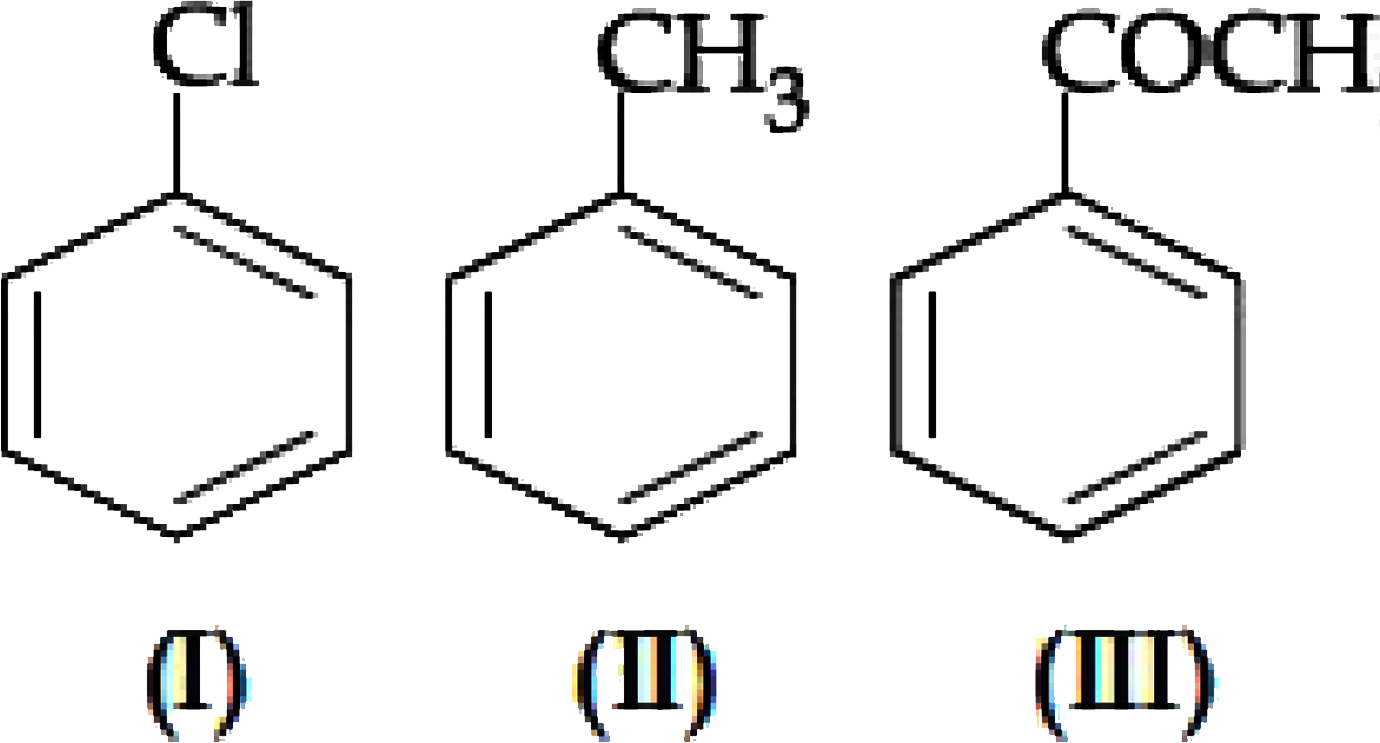Towards electrophilic substitution, the most reactive will be
nitrobenzene
aninne
aniline hydrochloride
N-acetylaniline
The correct Answer is:B
To determine which compound is the most reactive towards electrophilic substitution among the given options (nitrobenzene, aniline, aniline hydrochloride, and N-acetyl aniline), we need to analyze the effect of substituents on the electron density of the benzene ring in each compound.
1. Identify the Compounds:
- We have four compounds to analyze:
- Nitrobenzene (C6H5NO2)
- Aniline (C6H5NH2)
- Aniline hydrochloride (C6H5NH3Cl)
- N-acetyl aniline (C6H5NHCOCH3)
2. Draw the Structures:
- Nitrobenzene: Contains a nitro group (NO2) attached to the benzene ring.
- Aniline: Contains an amino group (NH2) attached to the benzene ring.
- Aniline Hydrochloride: The amino group is protonated (NH3+) and paired with a chloride ion (Cl-).
- N-acetyl Aniline: Contains an acetyl group (COCH3) attached to the amino group.
3. Analyze Electron Density:
- Nitrobenzene: The nitro group is an electron-withdrawing group, which decreases the electron density on the benzene ring. This makes it less reactive towards electrophilic substitution.
- Aniline: The amino group (NH2) is an electron-donating group. It increases the electron density on the benzene ring, making it more reactive towards electrophilic substitution.
- Aniline Hydrochloride: In this compound, the amino group is protonated, which means it cannot donate its lone pair effectively. This decreases the electron density on the benzene ring, making it less reactive than aniline.
- N-acetyl Aniline: The lone pair on the nitrogen is involved in resonance with the carbonyl group (C=O) of the acetyl group. This reduces the electron density on the benzene ring, making it less reactive compared to aniline.
4. Conclusion:
- Among all the compounds analyzed, aniline has the highest electron density on the benzene ring due to the electron-donating effect of the amino group. Therefore, it is the most reactive towards electrophilic substitution.
Final Answer:
The most reactive compound towards electrophilic substitution is aniline.
- We have four compounds to analyze:
- Nitrobenzene (C6H5NO2)
- Aniline (C6H5NH2)
- Aniline hydrochloride (C6H5NH3Cl)
- N-acetyl aniline (C6H5NHCOCH3)
- Nitrobenzene: Contains a nitro group (NO2) attached to the benzene ring.
- Aniline: Contains an amino group (NH2) attached to the benzene ring.
- Aniline Hydrochloride: The amino group is protonated (NH3+) and paired with a chloride ion (Cl-).
- N-acetyl Aniline: Contains an acetyl group (COCH3) attached to the amino group.
- Nitrobenzene: The nitro group is an electron-withdrawing group, which decreases the electron density on the benzene ring. This makes it less reactive towards electrophilic substitution.
- Aniline: The amino group (NH2) is an electron-donating group. It increases the electron density on the benzene ring, making it more reactive towards electrophilic substitution.
- Aniline Hydrochloride: In this compound, the amino group is protonated, which means it cannot donate its lone pair effectively. This decreases the electron density on the benzene ring, making it less reactive than aniline.
- N-acetyl Aniline: The lone pair on the nitrogen is involved in resonance with the carbonyl group (C=O) of the acetyl group. This reduces the electron density on the benzene ring, making it less reactive compared to aniline.
- Among all the compounds analyzed, aniline has the highest electron density on the benzene ring due to the electron-donating effect of the amino group. Therefore, it is the most reactive towards electrophilic substitution.
The most reactive compound towards electrophilic substitution is aniline.
Topper's Solved these Questions
- ORGANIC COMPOUNDS CONTAINING NITROGENBOOK - ICSECHAPTER - ORGANIC COMPOUNDS CONTAINING NITROGENEXERCISE - EXERCISE (PART-II DESCRIPTIVE QUESTIONS- VERY SHORT ANSWER QUESTIONS )
89 Videos
- ORGANIC COMPOUNDS CONTAINING NITROGENBOOK - ICSECHAPTER - ORGANIC COMPOUNDS CONTAINING NITROGENEXERCISE - EXERCISE (PART-II DESCRIPTIVE QUESTIONS- SHORT ANSWER QUESTIONS )
92 Videos
- ORGANIC COMPOUNDS CONTAINING NITROGENBOOK - ICSECHAPTER - ORGANIC COMPOUNDS CONTAINING NITROGENEXERCISE - ISC EXAMINATION QUESTIONS ( PART-II DESCRIPTIVE QUESTIONS)
33 Videos
- ISC QUESTION PAPERBOOK - ICSECHAPTER - ISC QUESTION PAPEREXERCISE - PART-II(SECTION-B)
74 Videos
- P-BLOCK ELEMENTSBOOK - ICSECHAPTER - P-BLOCK ELEMENTSEXERCISE - SOURCE BASED QUESTIONS
10 Videos
Similar Questions
Consider the following compounds:

the correct order towards electrophilic substitution reaction is
View SolutionArrange the following in decreasing order of reactivity towards electrophilic substitution reaction
Aniline (I) , Acetanilide (II)
phenol (III) , Anilinium chloride (IV)
View SolutionThe typical reaction of benzene and other aromatic compounds are electrophilic substitution. Presence of electron donating group activates the ring towards electrophilic substitution, while presence of electron withdrawing group deactivates the ring towards electrophilic substituion but at the same time activates the ring towards nucleophilic subsituion. Some groups are predominantly meta-directing and all of these are deactivating. Except halogen, most of the o−andp−directing groups are activating groups.
Which of the following compound is not formed.
_E01_248_Q01.png)
X represents mixture of organic compounds. The mixture does not contain
View SolutionThe correct order of reactivity towards the electrophilic substitiution of the compounds aniline(I),benzene(II) and nitro-benzene(III) is
View SolutionThe increasing order of the reactivity of the following compounds towards electrophilic aromatic substitution reactions is :

View SolutionThe increasing order of reactivity of the following compounds towards aromatic electrophilic substitution reaction is :

View Solution_2019_CBT5_E01_008_Q01.png)
The correct rate of reaction of given compounds towards electrophilic aromatic substitution reaction is
View SolutionThe increasing order of reactivity of the following compounds towards aromatic electrophilic substitution reaction is:

View SolutionPhenol is more reactive than benzene towards electrophilic substitution reaction.
In case of Phenol, the intermediate carbocation is more resonance stabilised.
View SolutionPhenol is more reactive than benzene towards electrophilic substitution reaction.
In case of Phenol, the intermediate carbocation is more resonance stabilised.
View Solution
